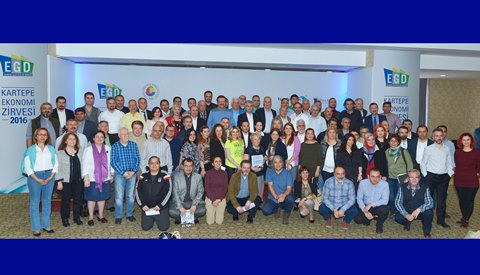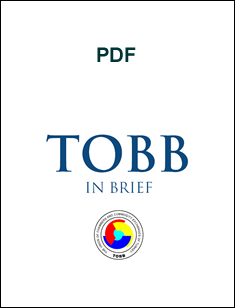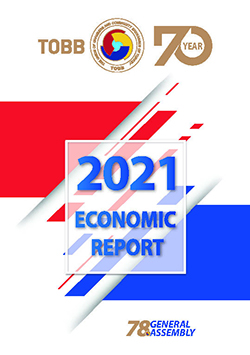“We must focus on opportunity, not risk”

09.04.2016 / Kocaeli
The Union of Chambers and Commodity Exchanges of Turkey (TOBB) President M. Rifat Hisarcıklıoğlu said, “We must focus on opportunity, not risk. Pessimism brings about negative energy causing everyone to have a negative outlook. Pessimism is contagious; let’s not let it become an epidemic. Turkey grew by 4% in 2015 and 3.4% following the 2008-2015 period. I believe that we will achieve an average rate closer to 5% this year.”
TOBB President Hisarcıklıoğlu gave a presentation at the Economy Journalists Association’s (EGD) 12th Kartepe Economy Summit on “Economic Outlook in the World and Turkey”.
Assessing the recently announced growth data of Turkey, Hisarcıklıoğlu stated that 2016 will not be an easy year; that various countries’ difficulties are still ongoing; that Turkey’s longest land border neighbor, Syria is still embroiled in armed conflict.
Stating that pessimism is contagious, Hisarcıklıoğlu emphasized the need to not let it become an epidemic and said, “Turkey is situated in a difficult region, undergoing a difficult time. I believe that adopting a mid-term perspective will be better suited to assess national issues. It is better to be looking at general trends instead of zooming in on specifics. 2016 will not be an easy year. However we must focus on what we can do better tomorrow while focusing on opportunities instead of risks. We will succeed if we focus on opportunity.”
Hisarcıklıoğlu stated that developed countries’ growth rates have surpassed those of developing countries’ with the exception of China and India, “In order to decrease the global wealth gap, developing countries must grow faster. If we disregard India and China, developed countries’ growth rates have surpassed those of developing countries.”
TOBB President Hisarcıklıoğlu stated that problems are present in developing countries’ with the exception of China and India.
- “The global crisis has affected developing countries more”
Hisarcıklıoğlu stated that the global crisis has affected developing countries more and developed countries growth rates between 2005 and 2007 was 2.7% while dropping to 1.6% in the last 3 years.
Hisarcıklıoğlu, stating that the growth rates of developing countries has dropped from 7.9% to 4.7%, said that the global crisis has affected developing countries more than developed countries; growth rate differences during said period have been larger in developing countries.
- “Global economy is recovering”
Reporting that the global economy has grown by 3.1% last year and is showing signs of recovery, Hisarcıklıoğlu stated that it is expected that the global growth, with signs of recovery at 0.3% to increase growth rate to 3.4%.
Hisarcıklıoğlu said, “Growth rates of developed countries are expected to increase from 1.9% to 2.1% in 2016 while developing countries’ rates will increase from 4% to 4.3%. The EU economy will grow by 1.7%. It had grown by 1.5%. This is a good development. The EU is our biggest market.”
Reporting that the global trade volume has increased by 2.8% in 2016, Hisarcıklıoğlu stated that it is expected to reach 2.8% in 2016.
- “There is a flow of money into developing countries as of last month”
Hisarcıklıoğlu reported that the exports of developed countries has increased by 0.2% in 2015, rising to 1.8%, “This is important for us. We export most of our goods to these markets. What benefits us is the expected 18% decrease in petroleum prices.”
Hisarcıklıoğlu stated that Euro-based interest rates are trending towards zero and that credit volume of banks in the Euro zone are finally increasing a long time, which is also a good development.
Reporting that there is an influx of money into developing countries recently, Hisarcıklıoğlu said, “Underlying this situation is FED’s decision to slow down interest increase rate and the European Central Bank’s lowering of interest rates to nearly zero. Developing countries have seen an influx of 37 billion USD. A billion of this has entered Turkey.”
- The Prime Minister holding the reins taut
The TOBB President stated that 2016 harbors both opportunities and risks for Turkey and said, “The risks we face are the upheavals in our region, acts of terror, FED-based uncertainties, decreasing buying power of petroleum-exporting countries and debt levels of the private sector.”
Pointing out opportunities for Turkey, Hisarcıklıoğlu went on, “The government has focused on its action plan. Last week, the list of reforms which have been enacted in the last three months were announced.The Prime Minister holding the reins taut. The revitalization of the EU process; reduced energy costs with the fall in petroleum and natural gas prices; continued discipline in public administration are all great opportunities for us. Experience has been gained in risk management in regards to private sector debt. As the real sector we must focus on opportunities, not risks. Pessimism brings about negative energy causing everyone to have a negative outlook. We do not focus on opportunities.
Turkey has achieved 4% growth. The global average is 3.1%. Developing countries’ average is 4%. I expect over 4% growth this year. After the crisis, we achieved 3.4% growth between 2008 and 2015. I believe that we will achieve an average rate closer to 5% this year.”
- “We must focus on sectors with over 4% growth”
Hisarcıklıoğlu touched on the importance of sector-based contributions and that generally 4% growth is being discussed; that when we look on the basis of sectors, it is clear that we must focus on better performing sectors in regards to growth figures.
Reporting that last year, compared to 2014, the finance sector grew by 10%, agriculture by 7.6%, tourism by 4.6% and education by 5.4%, Hisarcıklıoğlu stated that industry grew by 3.8%, below the national average.
Hisarcıklıoğlu stated that 3.7% portion of the 4% growth is composed of domestic consumption with 0.9% contribution from investments and -0.3% from exports; he emphasized the need to balance these three major components of successful growth.
- “Private sector contributes greatly to employment”
Stating that machinery and equipment investments in the private sector are once again showing growth trend in 2015, Hisarcıklıoğlu said “This is very important. Per capita machinery and equipment investments in the private sector have begun to increase again.”
Reporting that 892,000 people have joined the workforce las year and said, “In 2015, 688,000 people took up work. 611,000 of them are employed in the private sector while public administration employment stands at 77,000. This is very good. Additionally, off the record activity is also dropping, the private sector is entering records. Employment has increased to a new high with 658,000 in services sector. The most underwhelming sector is industry with only 16,000 increase. Construction has increased by 2,000 while agriculture has increased by 13,000.”
Stating that government funding is managed very well, Hisarcıklıoğlu reported that they are better positioned than 22 of EU’s 28 members and that budgetary income has increased by 14% in 2015 while expenditure has increased by 13%.
Hisarcıklıoğlu said, “Interest expenditure returns to us as taxes. The ratio of budget deficit to national income is 1.2%. This is an indicator that the budget is being handled well.”
- “Improvements in current deficit”
Hisarcıklıoğlu stated that a comparison of 2014 and 2015 would show an improvement in regards to current deficit with total current deficit dropping from 44 billion USD to 32 billion USD.
Stating that they expect 35 billion USD current deficit in 2016, Hisarcıklıoğlu stated that this would be split with 5bn USD in public spending, 108bn USD in financial sector, real sector has 59bn USD due in credit totaling 207bn USD altogether.
Reporting that real sector uses its credit in investments, Hisarcıklıoğlu stated that they are investing in the future of the country and expect no difficulty in paying debts.
- “Harvard projects Turkey will be second fastest growing country in its league by 2020”
Talking about his assessments regarding real sector, Hisarcıklıoğlu said that problematic credit has increased by 31% in 2015 while dishonored cheques have increased by 37%.
Reminding that prison sentences for unpaid cheques have been removed, Hisarcıklıoğlu stated that meetings with the government, Customs and Commerce Ministry, Justice Ministry and the Treasury have been completed and that as of January 1st, 2017, cheques will be QR coded.
Hisarcıklıoğlu stated that assessments will be made in regards to companies’ ability to honor their cheques on time and that there will be a “cheque index” on cheques ensuring that it is possible to see if the cheque is trustworthy. Hisarcıklıoğlu said, “It will be possible to see if the cheque is trustworthy. All cheques will have QR codes and that is a world first. Counterfeit cheques will be eliminated.”
Reporting that the ratio of closed companies to the newly established companies in 2015 has regressed to its lowest, Hisarcıklıoğlu said, “This ratio has dropped to 18%. For every 100 companies that were newly established, 18 companies closed down. This figure stood as high as 24 or even 36 in the past. 1.164 million companies have been established throughout the history of the republic as Inc. and LLC’s. The ratio of companies lasting beyond 5 years is only 67.5%; 42.6% for 10 years; 35.8% for 20 years. These ratios are much higher in Anglo-Saxon such as the UK and the US. Anglo-Saxon countries’ liquidation times are much shorter than ours. We are able to form companies but unable to maintain them over long periods. We must learn how to grow our companies. We’ve accomplished establishing them.”
- Importance of women entrepreneurship and innovation
Touching on the 3 key factors of prosperity, Hisarcıklıoğlu stated the importance of women’s entrepreneurship in this regard; pointing out that Turkey is third from last place on the OECD’s index of women’s participation in business life in 2014.
Hisarcıklıoğlu stated that despite this, there is progress; there are positive results for previous work to improve these conditions and that there is a great increase in the number of companies established by women in 2015.
Urging affirmative action for women entrepreneurs, Hisarcıklıoğlu said, “Turkey will benefit from encouraging young women towards entrepreneurship.”
Hisarcıklıoğlu stated that the 2nd factor of prosperity is innovation and underlined Turkey should aim higher in terms of global innovation.
- “Public spending on domestic goods has tripled
Pointing out that another factor of prosperity is branding, Hisarcıklıoğlu reported that Turkey’s average value per kilogram exported is 1.6USD.
Hisarcıklıoğlu said, “This number stands at 2.5USD for designer goods, 4.7USD for branded goods and 6USD patented goods.
Following the government backing for domestic goods by 15% in regards to pricing, Hisarcıklıoğlu said, “With this support public spending on domestic goods has increased from 10% to 30% in average during the last 6 months.”
Hisarcıklıoğlu emphasized the importance of raising awareness to the implementation of this policy.
Reminding that TOBB issues Domestic Goods Certificates, Hisarcıklıoğlu reported that 4,736 certificates in 71 provinces with 3,135 of them issued last year, 1,601 issued in the first quarter of 2016.
- Turkey has begun contributing to CERN
Hisarcıklıoğlu stated that Turkey has begun contributing to the European Organization for Nuclear Research (CERN) and said:
“This is very important. We’ve been after this for years. We’ve opened CERN’s contact office at TOBB. Being able to say that you’ve worked with CERN is better than any other certificate to prove your mettle. We are facilitating the participation of Turkish companies in CERN’s tenders. We will be holding the second meeting focusing in this matter on the 14th of April in which we will be introducing two giant projects costing 879mn USD. A company in Ostim, Ankara, is able to meet the requirements of CERN in quality and standards.”
Hisarcıklıoğlu stated that they want to bring universities and the business community together, having appointed academic consultants to every province to this end with the goal of implementing a joint consultation mechanism in local development.
Hisarcıklıoğlu stated that they have established the Occupational Proficiency and Certification Centers in order to address issues stemming from work incidents caused by unqualified personnel. Hisarcıklıoğlu reported that they would be issuing internationally accepted proficiency certificates for personnel proficient in elevator maintenance, wall construction, plasterers, concrete mixers and metal workers.
- High level visit to Gaza
Stating that TOBB has taken important steps in regards to international affairs and they’ve visited Gaza, Hisarcıklıoğlu reported that it was the highest level visit since 2012.
Hisarcıklıoğlu stated that they met with the Hamas Political Bureau Vice President İsmail Haniye and that the visit was not reflected in the press too much; stating that they have plans for an organized industry zone in Palestine, Hisarcıklıoğlu reported that they’ve come to the stage in development to lay its foundation which they want to do with the Prime Minister Ahmet Davutoğlu and President Recep Tayyip Erdoğan.
- “We must focus on e-commerce”
Touching on the fact that three key technologies will shape the future of industry, Hisarcıklıoğlu listed them as bio-technology, nano-technology and information-communication technologies.
Hisarcıklıoğlu drew attention to the fact that the use of cloud computing by SMEs in Turkey is very low and said, “E-commerce brings the whole world to your door. The ratio of companies which make use of e-commerce in Turkey is well below the OECD average. The whole world is using it; why aren’t we? You can sell your goods to the whole world via e-commerce.”
- “Turkey could be the second fast growing country”
Hisarcıklıoğlu stated that there are two possibilities in how Turkey will fare between 2014-2020 and said:
“Harvard posits that Turkey could be the second fastest growing country in its league. IMF projects that Turkey will be the 13th fastest growing country. If we fight among ourselves, IMF will be in the right. If we open up to the world and work together Harvard will have been correct. Harvard looks for potential. Turkey has the potential to be the second fastest growing country in its league. Let’s not bicker among ourselves.
Let us look to the future positively. Turkey, if able to make use of its potential, will show rapid growth. Turkey is a viable candidate to be even better than that. It would please us greatly to be able to contribute to this.”
- “Faults in suspension of bankruptcy must be addressed”
Hisarcıklıoğlu, replying to a question regarding the suspension of bankruptcy, stated that this is a much discussed issue by the public and that the relevant legislation entered into effect in 2004 with the number of companies requesting bankruptcy suspension in 2016 totaling 492.
“Bankruptcy suspension is a necessity. We are cooperating with the Ministry of Justice and the Customs and Commerce Ministry to work out the shortcomings in the system.”
Hisarcıklıoğlu stated that one of Turkey’s success stories is its reforms and pointed out that the government keeps close track of its promises in regards to reforms.
Stating that there is a certain amount of instability in the East and Southeast, Hisarcıklıoğlu reported that they’re working together with the chambers of the region and have started the “Sibling Chambers” project with them.
Hisarcıklıoğlu said, “These chambers discover their mutual potentials and form markets. Bingöl and Afyon chambers are paired. They are markets which complement each other’s experience.”
Stating that terror can be encountered anywhere in the world, Hisarcıklıoğlu said that, no matter where it happens, terror cannot be given any compromises; that a bomb in Belgium should not be treated any differently than one in Ankara.
Your message has been sent
Thank you |
News Title |




